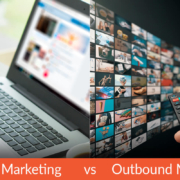What’s the Difference Between CPA and CPC? Why Should You Care?
You’re trying to run a business. You’re trying to get things done. You might think that you’re done learning new acronyms and abbreviations. Wrong!
We’ve got two more for you. These two pricing models are part of any digital ad campaign: cost per click (CPC) and cost per action (CPA). So, CPA vs. CPC: why should I care about it? Does it affect my digital advertising strategy? Let’s dig a little deeper, shall we?
Understanding Pay-Per-Click
First, the basics about pay-per-click (we in the biz call it PPC advertising). Spoiler alert: you see them every time you Google.
A searcher types what they’re looking for into Google’s search field. It could be a product, service, or maybe they just need information. Their search terms include a keyword that you are targeting as part of your digital ad strategy. Google sees the term and uses its internal algorithm to show your advertisement. The searcher clicks on the ad and ends up at a landing page that you set up to capture information as part of your advertising objectives.
The CPC Model
CPC is “cost per click,” and it’s pretty straightforward. Every time someone clicks your ad, you pay. This model owes its popularity to Google Ads (formerly Google AdWords).
The CPA Model
CPA is “cost per action,” meaning that if someone took some sort of specific action after they saw your ad, you’re charged for that action. Actions can include clicks, shares, likes, and form completions on landing pages. Google Ads, Facebook Ads, and social media platforms all have their own way of tracking actions taken, and what desired action counts toward payout.
CPC vs. CPA Takeaways
The main difference between the two methods is that a business pays for the click with CPC and pays for a user action with CPA. CPCs are usually more expensive than CPAs because they require more work from advertisers, who have to figure out what makes a user click on an ad, whether it’s the headline or something else in the text itself. An advertiser or business can spend additional time to optimize their ad campaign and refine their target audience to improve their click-through rate.
It all depends on what the advertiser or business wants to accomplish. If it’s all about brand awareness, CPC is the better choice. If there’s a specific product or service that you want to advertise, or the goal is lead generation, then CPA is the stronger method.
Budgeting for a CPC or CPA Campaign
A business will have a set amount of ad spend going into an online advertising campaign — but remember that some keywords have a higher average cost than others (because some words are more searched for than others). Paying for more popular keywords gets you more traffic. But, if your business is running a CPC campaign, you spend more for each click. It’s good practice to choose low-cost variations keywords that still have high search volume. You can still ensure that your ad is seen by potential customers, but you won’t be paying as much. As time goes on and your budget increases, you can start investing in those higher-cost keywords.
As you set your budget, keep in mind that you want to give yourself enough room to be successful. If your goal is to acquire new leads or drive sales, make sure the cost per acquisition is low enough for people who do convert into customers – and that it’s within reason based on your industry.
You also want to make sure that if you’re running a CPC campaign, your daily budget doesn’t exceed the number of clicks anticipated over one day. If it does exceed this amount, Google will stop showing ads until further notice or until they’ve been paid back by advertisers who did not receive any clicks during their time period.
Understanding Conversion Rate
Conversion rate is the percentage of the number of users who take your desired action. The conversion rate for CPC is calculated as the “number of conversions/number of clicks,” meaning that if you had 100 ad impressions and one conversion, your conversion rate would be 1%. It’s important to keep in mind that this metric is measuring how effective your marketing campaign was overall – not just the specific display ad or channel.
Choose the Best Model for Your Campaign
CPA and CPC are two of the most common digital marketing models. Every click and action is tracked, so you can monitor statistics like overall advertising costs and cost per lead. Keep in mind that these are just the basics, and you don’t need to be a digital advertising expert when you have local experts to do the work for you!
The team at Lift Marketing knows how to get the results you need – we’re here to discuss strategy and goals to get your business out there. Contact Lift Marketing today to get your digital advertising campaign off the ground!












